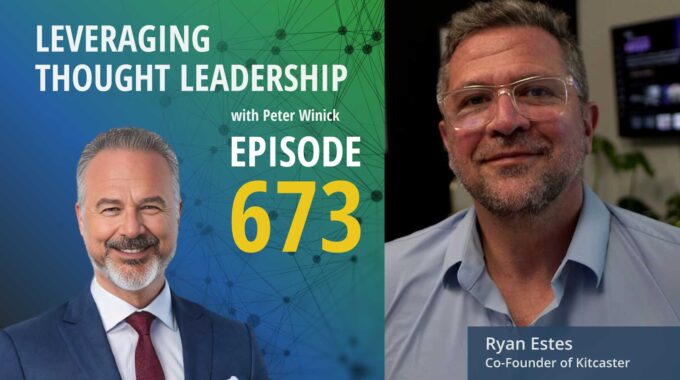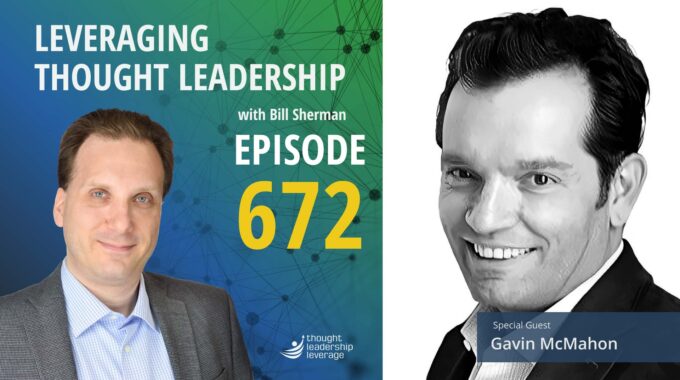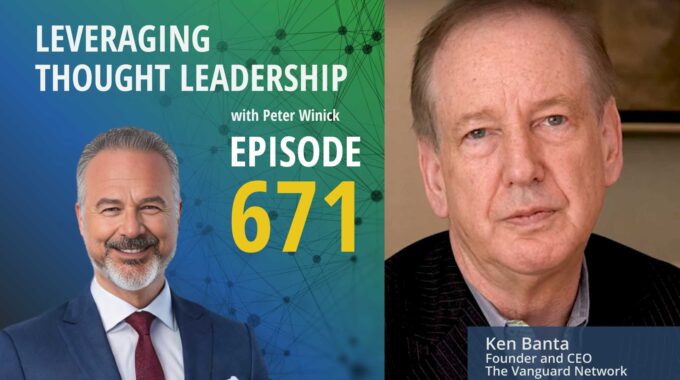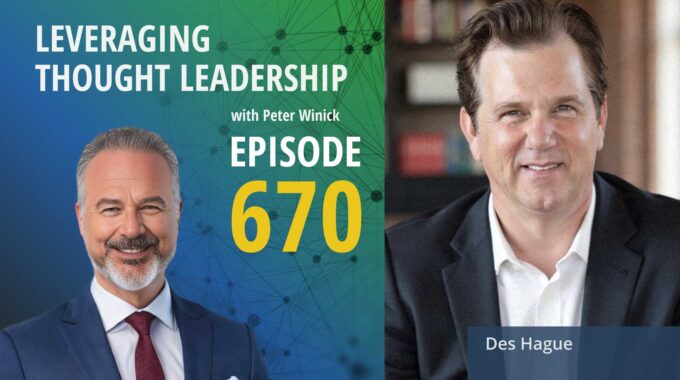Founder-led marketing, podcast strategy, and the art of authentic conversation What makes a podcast truly…
Lead with Empathy, Speak with Candor | Kim Scott
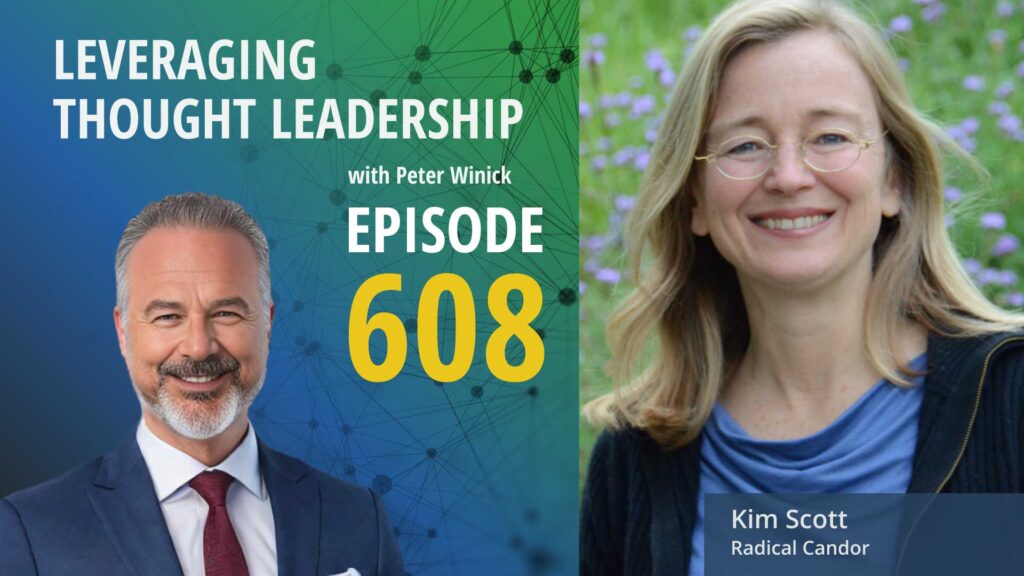
The Winning Formula for Building Trust and Accountability
Peter Winick and Kim Scott discuss the transformative power of Radical Candor in leadership, emphasizing the importance of giving honest feedback with empathy. Kim shares how leaders can build trust and drive team success by balancing clear expectations with genuine care for their people.
What happens when you mix radical candor with thought leadership?
In this episode of Leveraging Thought Leadership, Peter Winick sits down with Kim Scott, author of “Radical Candor” and “Radical Respect”, to explore how leaders can communicate effectively, especially when giving tough feedback. They discuss the importance of honesty, compassion, and clarity in leadership communication, showing how these principles can strengthen relationships and drive results.
Kim shares her insights on creating a culture of trust and transparency within organizations. She emphasizes that when leaders genuinely care about their team members, their feedback becomes a tool for growth, not criticism. Through real-world examples, Peter and Kim illustrate how radical candor isn’t just about being direct—it’s about balancing empathy with honesty to unlock true potential.
The conversation dives deep into the challenges leaders face when giving feedback, especially in high-pressure situations. Kim highlights the power of giving both praise and constructive criticism in a way that motivates and encourages continuous improvement. Peter and Kim also explore the nuances of how feedback can be tailored to different personalities, making it more effective and impactful.
If you’re looking to elevate your leadership communication and build stronger teams, this episode offers actionable insights. Kim’s advice is clear: to lead effectively, you must care deeply, speak honestly, and encourage your people to grow without fear of failure. A must-listen for anyone looking to strengthen their leadership style.
Three Key Takeaways:
Balancing Care with Candor: Leaders achieve greater impact when they provide honest feedback with empathy. This mix of care and candor builds trust and encourages open communication within teams.
Authentic Relationships Drive Success: Authenticity isn’t optional. Leaders who connect genuinely with their teams—seeing them as people, not just employees—create an environment where trust and motivation thrive.
Results and Relationships Are Partners: Effective leaders focus on both outcomes and relationships. By fostering a culture of accountability and respect, leaders help their teams excel and feel valued.
Entering the world of thought leadership without a strategy and finding success like Kim did isn’t common. Check out this article by Leveraging Thought Leadership CEO Peter Winick for tips on getting your strategy, tactics, and goals aligned early!
Transcript
Peter Winick And welcome, welcome, welcome. This is Peter Winick. I’m the founder and CEO at Thought Leadership Leverage. And you’re joining us on the podcast today, which is Leveraging Thought Leadership. Today I’m really excited. I get to speak to Kim Scott. She’s the author of Radical Candor and Radical Respect. She and Jason Rosoff co-founded a company to help leaders build more radically candid organization. Kim was a CEO coach at companies like Dropbox, Qualtrics, Twitter and other tech companies. She was a member of the faculty at Apple University, and before that led AdSense, YouTube and DoubleClick teams at Google. And obviously she’s also managed and I love this one, a pediatric clinic in Kosovo started a diamond cutting factory in Moscow. And in addition to her work on the radical side, she’s the author of three novels, Virtual Love, The Measurement Problem and the House Husband, which we will not necessarily get into today. So and I’m a you know, I feel like back in the days of Larry King, longtime listener, first time callers, I’m a big fan for a long time. So it’s a pleasure to have you on.
Kim Scott Well, thank you so much. I’ve been looking forward to our conversation.
Peter Winick So obviously, everybody wants to know how to start a pediatric clinic in Kosovo. So that’s not what we’re going to talk about today. That’s another show somewhere, I’m sure. So tell me about your journey, because, you know, radical candor has become such a thing. It’s part of the lexicon. It’s I don’t know if it’s quite emotional intelligence, but we talk I you just hear it all the time. And how did it happen? Like, how did this how did it come to be? What’s the origin story and what’s the business model?
Kim Scott Yeah, well, you know, I had a strange motivation for my career as an operating executive. I went to this I went to business school as a way to subsidize my novel writing habit. My first love is writing novels, but I did not think that I could that I could make a living.
Peter Winick Writing closes the well. The irony is that this is the antidote to the vow of poverty for fiction writing.
Kim Scott Yeah.
Peter Winick The only thing that is might be a close second place to a vow of poverty is fiction. Writing is nonfiction writing.
Kim Scott Yeah. Yeah, exactly. Exactly. Well, or so. So it’s interesting. I read a lot of books that that great writers have written and one that now I can’t even remember who it was. It was some it was a writer who’s a man. And he said, the most important thing you could do to become a writer is marry someone who can support you, but which is which is cool advice from a man, but like from a woman in 1980. Like, I just wasn’t going to I wasn’t going to take that advice. And so I decided I would earn as much money as quickly as possible so that I could then quit and write. And so I went through some of my career sort of feeling like my job was about 100% external validation. And then I would write on the side, which got no external validation because not only yes, I did not get I didn’t get any money. I got I had a stack of rejection letters for all the novels that I write.
Peter Winick Right?
Kim Scott And so it was 100% internal validation, 0% external validation. And then when I had this great coach when I was working at Google and he described being on an airplane with his this is a long winded answer to your question, but he described he described being on an airplane with his four sons under the age of ten.
Peter Winick Yeah, that sounds like fun.
Kim Scott Yeah. And it was stuck on the tarmac. And so he was miserable. And he said in order to be present, it didn’t mean wishing I was somewhere else. It was like, how can I express the best part of who I am, where I am, what’s going on? And so I decided that I needed to bring all of the, you know, all of the intrinsic motivation that I brought, right. Writing to my work. And I started enjoying my work a lot more. And funny. Funny how that happened. Yeah, but it didn’t work. So good advice. And then I got some advice from another mentor. Once I left Google, I went to Apple. I was designing this class called Managing it Apple, right? And I was one of the people who helped me design that class was Andy Grove, who had been the CEO of Intel for a long time. And he said he, too, started out his career wanting to be a writer when he was young. He wrote short stories and then obviously went on to do other things. But he said, Why don’t you write a book about management? Because management is very much it’s got all the elements of the drama of the novel. Yeah.
Peter Winick And there’s an audience.
Kim Scott Yeah.
Peter Winick There’s a market.
Kim Scott Yeah, yeah. And so I wrote the book, but I didn’t even think I would sell Radical Candor. I started writing it as I was coaching. I wound up leaving Apple and I became the C, the coach for the CEO of Twitter. And then. And then once that happened, a lot of people wanted me to be their coach. And so, I wound up writing radical candor, really in the context of helping them. But also, a lot of people were asking me to be their coach, and I’m a human being. I don’t scale. And so I was writing the book to share what I knew with other people. And then a friend of mine convinced me to try to get it published, and the rest is history. Yeah. So there you go.
Peter Winick So you wrote it, but you didn’t have this grandiose vision of then it will become training, consulting, you know, all the other derivatives.
Kim Scott I had.
Peter Winick Again? Yeah. So. So. So you write it. You. Well, one is you hit a nerve, right? Like, there’s lots of books on management that sit on the pile of mediocrity.
Kim Scott Yes.
Peter Winick In the bookstore. And sell 70 copies over there. Like. Yeah, but why do you think Radical Candor took off the way it did and how it did?
Kim Scott Yeah. So I think most people who write, most people who have been operating executives are not interested in writing. Like but like, the overlap in that band is very small.
Peter Winick And while that. Well, I would, I would, I would push on that slightly saying. At the point when they are operating executives, many of them after the fact want to. Right to, you know, encapsulate their stories and their vision and all that sort of stuff. But when you’re running a multibillion-dollar company, you probably don’t, you know, are looking for other things to do to fill in the time that you don’t have anyway.
Kim Scott Yes. And I think more importantly than that, if you ask most operating executives how much time they spend reading novels and writing novels, it’s zero. And I think I think actually the fiction aspect of it was really important. The fiction reading and writing that I’ve done in the past. So I think part of it is part of the reason why the book worked is that I really love writing for its own good, not just to like share my legacy as that, you know. But I actually liked the writing part and was actually interested in that. But the thing that really motivated me, like the reason I left Google and went to Apple was that I realized I really didn’t care at all about cost per click. The thing that interests me and my job, by the way.
Peter Winick If you’re at Google and you don’t care about that, you probably shouldn’t be at Google.
Kim Scott Yeah. Yeah. Yeah. I don’t know. I mean, I think cost per click was taken care of itself. Really?
Peter Winick Yeah. Right. Really?
Kim Scott It was doing really well. But the thing that motivated me and, and I think the reason why I was effective at Google was thinking about how do you build teams, how do you set up structures so that people can do the best work of their lives and build good relationships. So. So that was the thing that really interested me. And what Apple offered that Google didn’t was an opportunity to spend full time thinking about, you know, how are we going to how do you manage people? So I think it also the experience spending two and a half years at Apple just thinking about teaching people how to manage was also really helpful. Like I think most people yeah, most people don’t spend go from leading a team.
Peter Winick But go back to that. Why do you think that? Why did it take off? Because it wasn’t like, okay, went after this with $1 billion marketing budget and.
Kim Scott No, no, no, no.
Peter Winick Whatever. Like what was going on either at that moment in time in the business universe or why did it hit.
Kim Scott Yeah.
Peter Winick Why do you think it?
Kim Scott So that was a long winded. Way of saying. I think part of the reason why it hit is that it’s well written It’s a good book.
Peter Winick Okay, Good to know. But. Okay. But that but I think that’s important because there’s so many books out for so many reasons that just aren’t.
Kim Scott They’re not especially well. Yeah. Yeah. Okay. I think also I was genuinely interested from the time I started my first management role and in 1991 I was generally genuinely interested in the management part of, of building a business.
Peter Winick Okay?
Kim Scott And, and most people are like, I went to business school and how many classes did I take about managing people? Zero. Not nothing. The thing I did learn a business goal is it a good two by two framework can solve all the world’s problems. And I think the two by two framework and radical candor is part of what struck a nerve. And the Dubai two framework is sort of vertical line. This care personally horizontal line is challenge directly. And when you can do both, it’s radical candor. And that’s really important because I think we so often feel like we have to choose between being effective and being nice. And you don’t. You can do both, you know, and I think that’s part of why it struck a nerve. It kind of dispelled the nice people finish last myth that is that is really out there. I think a lot of people hate the idea of becoming a manager because it’s like if you think about all the relationships in our lives, most of them have a positive valence, you know, family relationships, parent child like. I mean, obviously there are bad relationships between parents and children, but mostly their positive valence. But if you think about the relationship between a boss and their direct support, it’s a very negative even the word boss, manager, leader, all of those words have negative connotations. And yet all of us have managers and a lot of us become managers. And that was one of the things I really set out to fix. So I think it hit a nerve also because we’ve come to a moment in our economy where people are unwilling to pay the asshole tax. You know, they’re not they’re not willing they’re not willing to work for someone who treats them miserably. Yeah. And but yeah, so no, I.
Peter Winick Think that’s important because I think, you know, you and I are probably similar age we were coming up. It wasn’t really an option. Like if you got stuck in the killer job and the boss was a jackass. It just that was here. Sometimes.
Kim Scott Actually, there were.
Peter Winick Synonymous. Like, yeah, the best, the best opportunities came working for toxic people, which now the culture is changing.
Peter Winick If you’re enjoying this episode of Leveraging Thought Leadership, please make sure to subscribe. If you’d like to help spread the word about our podcast, please leave a five-star review at ratethispodcast.com/ltl and share it with your friends. We’re available on Apple Podcasts and on all major listening apps as well as at ThoughtLeadershipLeverage.com/podcast.
Peter Winick So I want to segue into okay so now it resonates. It’s meeting a need. There’s an issue like, okay, the culture is changing, it’s well-written. Let’s get to the business models because okay, now we’re adding this is like 3D chess, right? Okay. So first write a really good business book. So now we’ve just eliminated 85%, 90%. Right? Then have it resonate. You have to.
Kim Scott Like intrinsically write to write a great book. If you don’t love writing, don’t do it because it’s probably not going to be worth your time.
Peter Winick But the next piece but where I was going is okay. So now there are there are a smaller subset of the population of business books that are well-written, good business books.
Kim Scott Yeah. And then.
Peter Winick Click again. There’s a smaller, smaller, I would argue pick a number 50, 100, 200, whatever that have actually been the basis for launching really nice businesses. Yeah. You’re in that special place. Yeah. Right. So how, what was the strategy? How did that happen? How did you figure out? Wait, I can take the same ideas in this book and turn it into training or coaching or consulting or what? What was that? Because the business side of it is taken off, obviously.
Kim Scott Yes, it has. And here’s a true confession. I had no strategy. I had no idea this was even nothing. In fact, there was one day when I was I had been asked to give three talks in San Francisco. And by the end of that day, three talks is probably two too many in one day for me. And yeah, so after the third one, I was sort of I literally went back into the green room and I was lying on the floor for involvement. And this other guy who was also speaking, Mike Robbins yeah, I learned by yeah, yeah. Mike was really a he. He did what a good Upstander does. He said, Well, how much are you charging? This must have been a good day for you And I. Then I sat up. I was like, charging. What do you mean? I didn’t even know you could charge to give a talk. You know, I had no idea that that was the thing.
Peter Winick Okay, so two things that that deflate me is, okay, there’s no strategy, and I didn’t know you can charge for speaking, so we’re going to call you the ax. The accidental, commercially successful thought leader.
Kim Scott Yeah, it was. Absolutely. And frankly, I like I don’t even like the word thought leader. Like that’s not how I think of myself. So but I do really care about these ideas. And I do want people I do. I think bad bosses create so much misery in the world. And yeah, if the thing that I can contribute to the world is to decrease that misery a little bit by helping bosses be better, because I think most bad bosses are not actually bad people. They just don’t know how to be a boss because we’re not judging them. So that’s the problem I’m hoping to solve with the business. So anyway, then I started charging and this is a true story. So and then I asked him how much he charged. I was like, my gosh, this is a racket. Yeah. And I kept increasing my rate until I until people stopped asking me to talk. And. But then no, then even then I was overwhelmed. I was asked to do more talks than I could possibly do.
Peter Winick But this graph but this goes back to the coaching issue of it doesn’t scale, right? So now.
Kim Scott It doesn’t.
Peter Winick If you’re going to be exhausted lying at the end, you know, on the floor of a green room for doing three dogs, it’s better to make 50 or 100 grand that day doing it than making nothing.
Kim Scott Yeah, exactly. But I wanted it wasn’t really about making money. I wanted to spread the ideas. And so a couple of people reached out to me and they said, We really like radical candor. And these were people who had been serious operating executives. And at this time, it was all kind of happening in Silicon Valley. Yeah. And they said, I’d love to give some of these talks. And I was like, okay. So I was sitting at breakfast with my children who at the time were like, like in third grade or so. They were really young. And I said, Well, I’m going to start letting other people do that. I’m going to teach a few other people to do these tours. How much should I how much of the money should I give them?
Peter Winick And which of your board of advisors is seven year old?
Kim Scott Yeah. And my husband, I mean, we’re just sort of chatting and I look and my daughter says, Well, why would you give them any of the money? I’m like, Well, they won’t do it. And, and also, I want to spend more time with you all. You know, I don’t want to travel all the time. And they and then they were like, we’ll give them all the money. And I said, well, if I give them all the money that I can’t buy you all toys. And then my daughter thought about it, my son thought about it. And they sort of talked between themselves and they said, give them 70% and we’ll keep 30%.
Peter Winick So is that how you came to that?
Kim Scott How we started? That was how we started. Yes. So I know.
Peter Winick So that’s that is like strike for most a strike for so. So what was it? You’re not into strategy. Your board of advisors is seven and probably still drinking juice boxes. Yeah. You’re giving away 70% of the revenue and you’re not charging for speaking.
Kim Scott Yeah. Yeah. Well now I’m charging for speaking. Yeah. So and then I wound up starting a software company, not a speaking. I wasn’t thinking of like speaking as the main thing and the software. We built one app, we built another app, we built a third app. They all failed to try to help people be more radically candid because I wanted to scale this thing, right.
Peter Winick I thought that your programmers might have been the classmates of your board of advisors. They might know
Kim Scott No.
Peter Winick Other, Okay, I was just double checking that.
Kim Scott No, because. No, I, I had lunch.
Peter Winick Child labor laws.
Kim Scott But the problem here was I had lunch with a colleague of mine, and I was talking to him about the idea of starting this business, the software business. And by the end of launch, he was like begging to, to invest $2 million in the idea, which was a lot. Well, well, they had me.
Peter Winick In the Silicon Valley.
Kim Scott Right? Yeah. Yeah. Anyway, I should not have moved so fast on that one. Sheryl Sandberg, when she was my boss at Google, said, “Your biggest problem is you move too fast.” And that was definitely a problem on that idea. So anyway, we started this company, The company failed and finally I accepted. Okay, What we have is a is what does work are the talks and the workshops. And I wrote a blog post about that because what radical candor and also radical respect. The next book I wrote are really about. Yeah they’re really about putting your phone away, putting your devices away, shutting down all your apps and having real human conversations with people. And so, so the talks in the workshops are really important for that. And I wrote a blog post about that and Jason rose off Reddit and reached out to me and he said, let’s take a company that’s doing what you should have been doing all along. So that’s how it came to happen. I love following.
Peter Winick This is great. So I love getting under the hood with you and understanding the story and how it came to be. And this is this has been great. Really not what I would have guessed any of the answers to any of the questions were. So that’s kind of cool because there you know, there are certain things that are manufactured content. I call it like, it’s this idea, like we’re in a work from home environment. Let me be the work from home special. Yeah.
Kim Scott That’s not what this is.
Peter Winick Yeah, this was, was. But, but I think that, you know, the you can’t underestimate the good writing and I think also that you were really good at listening to how it landed. Right. And where it could go next and what folks can do with it. And I like the idea of realizing you can get paid to do a lot of thought. Leaders don’t realize that there’s lots of things that they do before they do this professionally, that someone will pay them a ridiculous amount of money like way keynote speaker You paid that much to do that for 45 minutes. Like. Yeah, like, yeah. Well I.
Kim Scott But, but I had to have had a lifetime of writing and a lifetime of being the operating executive before, you know.
Peter Winick When something to write right. And something to draw from. Right. That’s exactly right. Yeah. Well there’s been great. Appreciate your time. It’s been a pleasure to talk to you and a thank you for all the work you’ve put out into the world. That’s cool. And thanks for spending some time with me today. I appreciate it.
Kim Scott Thank you. Really enjoyed the conversation.
Peter Winick To learn more about Thought Leadership Leverage, please visit our website at ThoughtLeadershipLeverage.com. To reach me directly, feel free to email me at Peter at ThoughtLeadershipLeverage.com. And please subscribe to Leveraging Thought Leadership on iTunes or your favorite podcast app to get your weekly episode automatically


